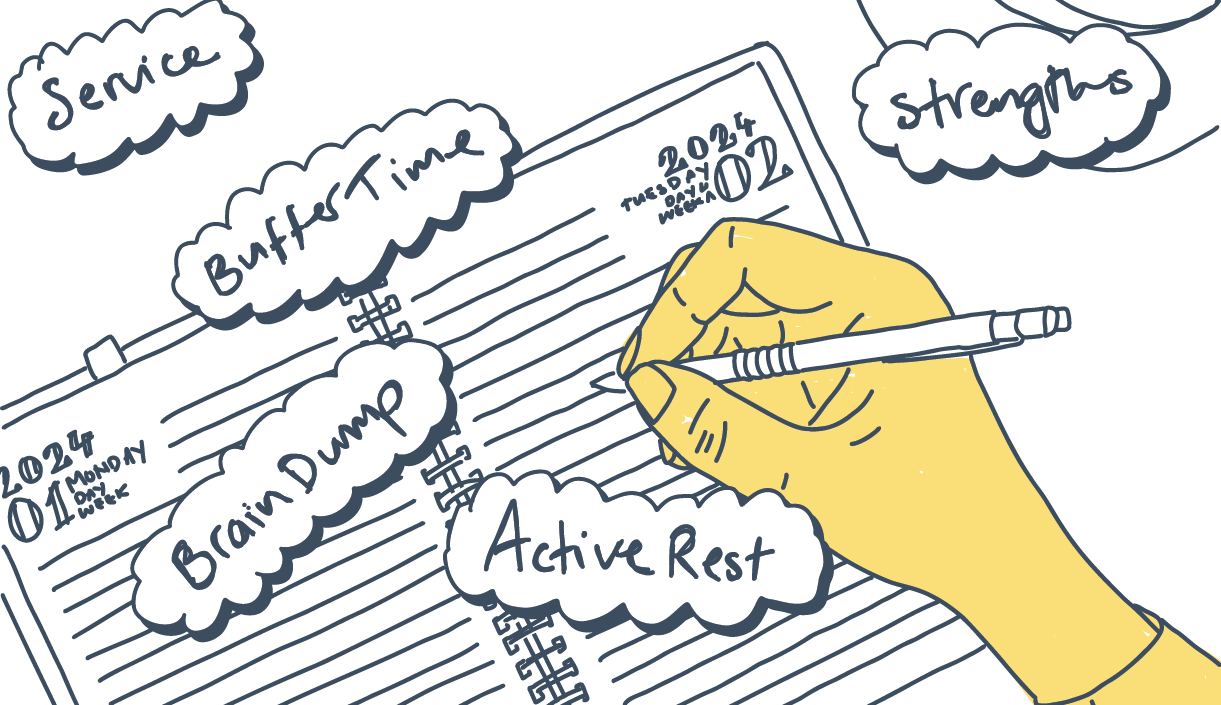Scheduling Tools to Preempt Busy Reactive Days
Does your work system feel more like A or B?| A | B |
|---|---|
|
|

Reflective Diary Elements
- Buffer Time
- Brain Dump
- Loop Closing
- New Strengths Use
- Active Rest
- Side/Delight Project
- Wiki-Wormhole
- Service
- Gratitude/Celebration
- Purpose Refining
- Buffer Time: Scheduled intervals between tasks or appointments that give you flexibility and downtime. These periods can be used to manage unexpected demands and transition between activities, or you can block out days or half days that you don’t schedule anything for until the day before.
- Brain Dump: A technique to clear your mind by transferring ideas onto paper or a digital tool. This practice can help reduce mental clutter, improve focus, and facilitate better planning and prioritisation by making thoughts and tasks more tangible and manageable.
- Loop Closing: Similar to the brain dump, loop closing is a mindful and reflective activity to capture worries, concerns, and to-dos. It’s also important to recognise that you can capture half-formed anxieties. Just listening to yourself in this way can make the difference between being able to focus or not. You can also use loop closing to practically finish a load of little tasks.
- Signature Strength, Novel Use: Identifying and applying your core personal strengths in new and diverse ways. This practice encourages creativity and personal growth by finding unique applications for your innate talents and abilities, enhancing satisfaction and effectiveness in both personal and professional contexts.
- Active Rest: Engaging in restful yet mentally or physically stimulating activities, as opposed to passive relaxation. Examples include walking in nature, practising hobbies, or gentle exercise. Active rest rejuvenates the mind and body, promoting wellbeing and maintaining energy levels for prolonged productivity.
- Side Project / Delight Project: A personal project pursued out of interest or passion rather than obligation. Whether it’s a creative endeavour, learning a new skill, or volunteering, these projects provide a sense of fulfilment and joy and an outlet for creativity and personal expression.
- Wiki-Wormhole: The act of exploring information or learning new facts through online platforms, such as Wikipedia, in a nonlinear or serendipitous manner. This activity stimulates curiosity and can expand knowledge on various topics, though it requires discipline to manage time spent in exploration.
- Service: Activities or work performed for the benefit of others without expectation of reward or recognition. Service can involve volunteering, helping neighbours, or any act of kindness. Engaging in service fosters a sense of connection, community, and personal fulfilment through contributing to the greater good.
- Gratitude / Celebration: The practice of acknowledging and appreciating the positive aspects of life and celebrating achievements and milestones, big or small. This can be done through journaling, sharing with others, or reflective meditation. Fostering gratitude and celebrating successes enhances wellbeing, reinforces positive relationships, and promotes a positive outlook on life.
- Purpose Refining: The continual process of reflecting on your values, goals, and passions to clarify and adjust your sense of purpose and direction. This can involve setting aside time for self-reflection, seeking new experiences, and adjusting goals to align with evolving insights and aspirations. Purpose refining helps maintain motivation, direction, and a sense of meaning in life.
The Practice
Copy or make a note of the 10 reflective diary elements and keep it handy. Make time once a week to design your days in the future to be balanced and as reflective as you want them to be.
Written by Bruce Stanley on Sat, March 23, 2024
Please share this
Related posts
Setting intentions – the Day Crafting tool you’ll use most
Have you heard of a stitching pony? Every craft has ubiquitous tools, the potter's wheel, the smith's anvil, the carver's chisel – and the leatherworker has the stitching pony which is used to grip the material. To the Day Crafter the tool used most often has to be intention setting.How To Think Like A Day Crafter
I'm fortunate enough to be in control of my schedule, so why does the 9 to 5 work ethic, amongst other influences, still loom and glower over my thinking? I feel like a long departed influential industrialist striking a pose like Isambard Kingdom Brunel is shaping my choices. Along with him is a sports (or business) coach who talks about goals and winning and success. I think there is a capitalist media mogul in there too, pushing rumours and feeding worries about insecurities that I can purchase my way out of.
A to-do list of to-do lists
Lists are not the best solution at the productivity and information management system level. For that, I use a Kanban system like Trello.
Having a to-do list-driven work system can lead to overwhelm and stress as you never get to the end of it, and it allows you to bypass prioritisation and choose, at the moment, what you feel like doing next.
